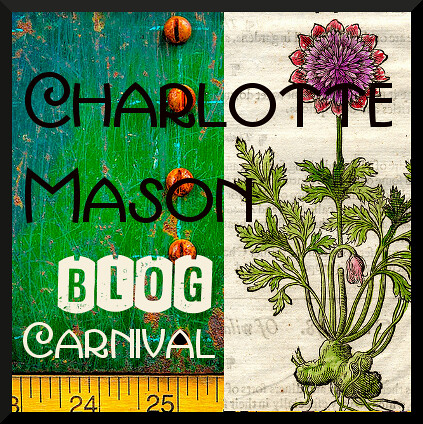
One of our very favorite things to do when we start a new Shakespeare play,
It is a foregone conclusion*, that my ideas are much better developed now than before. For one, by Jove!* I've discovered that a Shakespeare play, as diluted by Lamb or Nesbit, isn't much different from a fairy tale, the value of which I am quite convinced of. The themes in Shakespeare are more real life too, which helps them deal with stony-hearted villains* within a safe context, and that's good. Also, as the kids are familiar with the storyline, they'll be excited at how much they'll be able to understand when they revisit the play later on. That's good too.
Seemingly without rhyme or reason*, however, I have this recurring feeling that I'm doing my kids a great injustice; big spoilers and all, giving away all the story lines WAY ahead of time. All my newly found reason and resolve begin to vanish into thin air*, until I revisit a quote like these:
"Little by little the people of Shakespeare, filling a larger world than she could know, became as real to her as her friends. That was the great gift he brought her."
~Shakespeare and the Heart of a Child, Gertrude Slaughter
"In [Form 2B] they read their own geography, history, poetry, but perhaps Shakespeare's Twelfth Night... should be read to them and narrated by them until they are well in their tenth year. Their power to understand, visualise, and 'tell' a play of Shakespeare from nine years old and onwards is very surprising. They put in nothing which is not there, but they miss nothing and display a passage or a scene in a sort of curious relief.
Charlotte Mason, v6p182
or then, there's these:
"...a child has entered into Shakespeare's Temple of the human spirit and come forth charged with a knowledge far beyond his present or his future experience. It cannot all happen on a summer day. Step by step, slowly and serenely, under a clear sky, the child approaches by pleasant ways to an understanding of life... and a sane and healthy joy of life is entrenched in the child's mind against the blows of fortune by the beauty of the medium through which the world has been revealed."
~Shakespeare and the Heart of a Child, Gertrude Slaughter
"The transition to Form IIA is marked by more individual reading as well as by a few additional books. The children read their 'Shakespeare play' in character. "
Charlotte Mason, v6p182
And then of course there are blog posts like this one, that really help me get a grip on things. So, if the truth be known*, I'm feeling pretty good lately about reading Shakespeare with my kids of all ages.
"In Forms III and IV... They have of course a great flair for Shakespeare, whether King Lear, Twelfth Night, Henry V, or some other play..."
Charlotte Mason, v6p184

Like this idea? See my recent Cymbeline post here for more... :)
Helpful Links:
- Shakespeare: Cymbeline (includes ideas for using Shakespeare with all ages).
- AO Shakespeare Rotation
- Article, Shakespeare for Christians?
- Interesting dialogue going on at the AO forum: Shakespeare for Olders: How to study the Real Thing Shakespeare Questions: Years 1-3
Helpful Books:
**See amazon links below (yep, you can click there to support our homeschool habit!)
For youngsters:
Shakespeare, Bard of Avon
Shakespeare coloring book (paper dolls)Tales from Shakespeare (download in various formats) or get the audio @ Librivox.org
For elders:
Brightest Heaven of Invention

















8 comments:
Great post! I love the *s. I caught on right away. :)
oh goody! ;) @Makita!
Awesome drawings!! Great post Amy. I love the quotes!
Amy,
Your posts about Shakespeare have been quite helpful to me. Thank you for investing the time to share with the rest of us what has worked for you.
I *love* the character sketches--I'm so glad you shared them! Please tell your children that they are fantastic drawings! They put my stick figures to shame. LOL I think I just need to wait it out until my children get old enough to take over the job from me. ;)
well, you're welcome of course. it helps me to have it all written down too! :)
@celeste, yay! the sketches are my FAVORITE shakespeare help :) of course, for non-artistic kids, it would be a huge frustration.
so, i would only recommend it if it's something helpful AND fun :)
for one of the best shakespeare posts ever… @ mental multivitamins... click here
Post a Comment